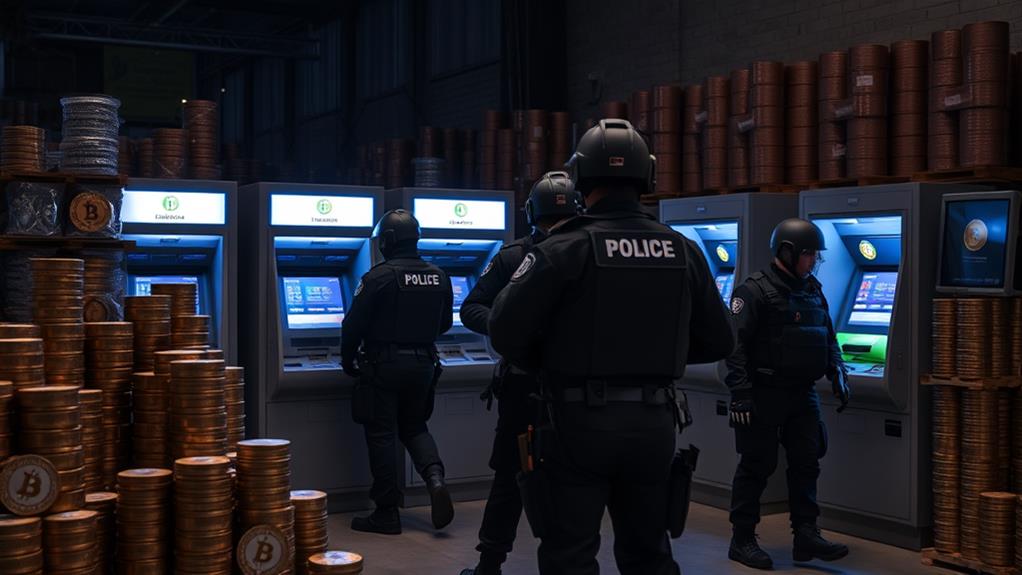
German authorities have taken decisive action against cryptocurrency operations, seizing 13 crypto ATMs and confiscating nearly $28 million in assets across 35 locations. This crackdown reflects Germany's cautious regulatory approach towards digital currencies, aiming to combat illicit activities and assert control over the crypto market. The operation has sparked debate within the crypto community, raising concerns about potential impacts on innovation and market growth. While Germany doesn't prohibit cryptocurrency ownership, it imposes strict regulations on crypto businesses. This regulatory stance creates uncertainty for the future of cryptocurrency operations in the country, with potential ripple effects on the global digital asset landscape.
Table of Contents
Seizure Details and Scope

German authorities have taken decisive action against cryptocurrency operations, seizing 13 crypto ATMs and confiscating nearly $28 million in assets across 35 locations. This sweeping operation marks a significant escalation in the country's efforts to regulate the crypto industry, sending shockwaves through the digital currency community.
The ATM confiscation, coupled with the substantial asset seizure, underscores the government's determination to assert control over crypto activities. While proponents of financial freedom may view this as an overreach, regulators argue it's necessary to combat illicit activities.
The crackdown's scope raises questions about the future of crypto in Germany. As authorities tighten their grip, the regulatory implications for businesses and individuals operating in this space become increasingly complex. This move signals a critical juncture for the German crypto ecosystem, potentially reshaping its landscape for years to come.
Germany's Regulatory Stance
The recent crackdown reflects Germany's broader regulatory stance on cryptocurrencies. While not outright banning digital assets, German authorities maintain a cautious approach, imposing strict regulations to mitigate risks associated with their use. This position has sparked debate within the crypto community, with critics arguing that such measures stifle innovation and hinder market growth.
The legal implications of these actions are significant, potentially deterring both illicit activities and legitimate crypto businesses. Market reactions have been mixed, with some investors viewing the crackdown as a necessary step towards a more secure and transparent ecosystem, while others fear it may drive innovation elsewhere.
As Germany navigates the complex landscape of digital currencies, finding a balance between regulation and fostering technological advancement remains essential. The crypto community must adapt to this evolving regulatory environment while advocating for policies that protect financial freedom.
Impact on Crypto Ecosystem

Three key impacts on the crypto ecosystem have emerged from Germany's recent crackdown. To begin with, the seizure of crypto ATMs and assets has raised concerns about market innovation, potentially stifling legitimate cryptocurrency use and development. This heavy-handed approach may deter entrepreneurs and investors from exploring blockchain technologies, hindering progress in the sector.
Secondly, the crackdown highlights the ongoing struggle to balance regulation with the crypto community's desire for financial freedom. While authorities aim to curb illegal activities, their actions risk alienating law-abiding users and businesses.
Lastly, the confiscations have intensified the debate surrounding cryptocurrency's role in modern finance. As regulators tighten their grip, the crypto ecosystem faces a critical juncture: adapt to stricter oversight or risk further marginalization. This development underscores the need for a nuanced approach that addresses security concerns without sacrificing the potential benefits of decentralized finance.
Current Legal Framework
Despite its recent crackdown, Germany does not explicitly prohibit cryptocurrency ownership or use. However, the country imposes stringent regulations on digital assets, aiming to mitigate risks associated with their use. The legal framework requires crypto businesses to obtain licenses and adhere to strict compliance standards, creating significant compliance challenges for operators.
Germany's regulatory approach emphasizes digital asset security, demanding robust measures to protect investors and prevent illicit activities. The recent confiscations demonstrate the authorities' commitment to enforcing these regulations vigorously. While the current framework allows for cryptocurrency operations, it creates a complex landscape that operators must navigate carefully.
As the crypto ecosystem evolves, Germany's legal stance remains fluid, adapting to new challenges and technologies. This dynamic environment underscores the need for crypto enthusiasts and businesses to stay informed and agile in their approach to compliance and operations within the country.
Future of Cryptocurrency Operations

As Germany's regulatory landscape continues to evolve, the future of cryptocurrency operations in the country remains uncertain. The recent crackdown has sparked concerns among crypto enthusiasts and innovators, who fear that strict measures may stifle crypto innovation and hinder market growth. However, this challenging environment may also drive market adaptation, forcing operators to develop more transparent and compliant systems.
The crypto community must now navigate a delicate balance between adhering to regulations and maintaining the decentralized ethos of digital currencies. Forward-thinking companies may seize this opportunity to create innovative solutions that satisfy both regulatory requirements and user demands for financial freedom. As the global crypto ecosystem watches Germany's actions closely, the country's approach could potentially shape the future of cryptocurrency operations worldwide, influencing how other nations address the intersection of digital assets and traditional finance.
Conclusion
This monumental crackdown on crypto ATMs and assets in Germany sends seismic waves through the global cryptocurrency landscape. The operation underscores the nation's unwavering commitment to regulatory compliance and financial stability. As the dust settles, the crypto industry faces a pivotal juncture, balancing innovation with legal constraints. The future of digital currencies in Germany hangs in the balance, potentially reshaping the broader European crypto ecosystem and influencing regulatory approaches worldwide.







